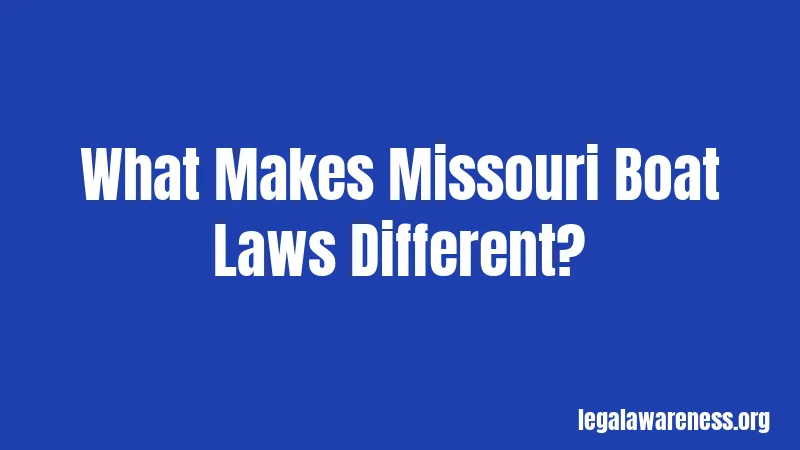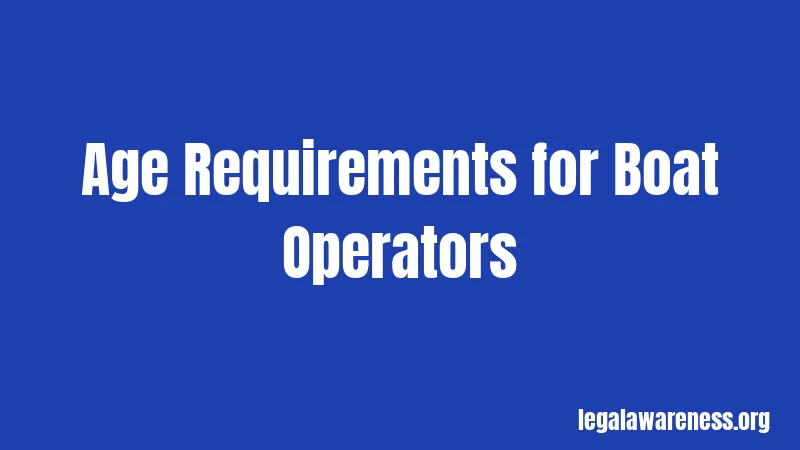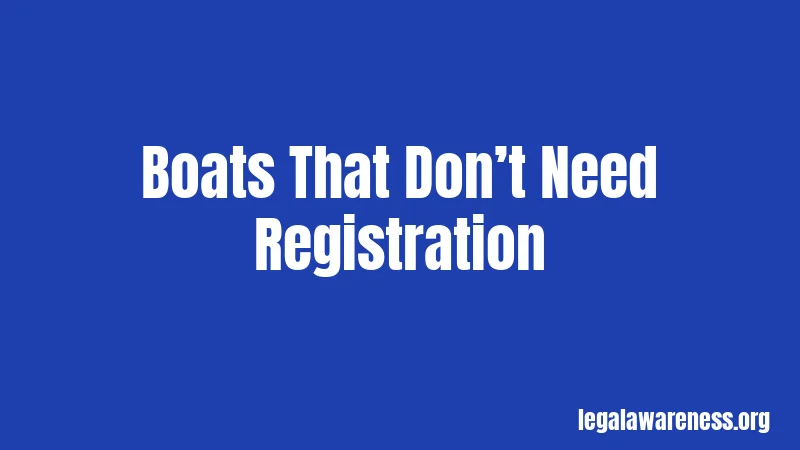Boat Laws in Missouri (2026): Know Before You Go
Most people don’t realize how strict Missouri’s boating laws actually are. Seriously. You can’t just grab a boat and hit the water without knowing the rules. The penalties can be harsh, and nobody wants their lake day ruined by a fine or worse.
Let’s break down exactly what you need to know to stay legal on Missouri waters.
What Makes Missouri Boat Laws Different?

Missouri takes water safety seriously. The state manages some of the country’s most popular lakes. Lake of the Ozarks alone sees millions of visitors every year. With that many people on the water, rules matter.
The Missouri State Highway Patrol’s Water Patrol Division enforces these laws. They patrol constantly during peak season. Trust me, they will stop you if something’s not right.
Who Needs a Boating License in Missouri?
Here’s the deal. If you were born after January 1, 1984, you need a Boating Safety Identification Card. No exceptions.
This card is basically your boat license. You must carry it on the boat whenever you operate any motorized vessel. That includes jet skis, WaveRunners, and any boat with a motor.
Getting the card is pretty straightforward. You take an approved boating safety course. Then you pass a test. The course costs $20 and the lifetime card costs $15. So for $35 total, you’re legal for life.
You can take the course online or in person. Online is easier for most people. The Missouri State Highway Patrol offers approved courses through their website.
Not sure if you need one? If you’re 40 years old or younger, you definitely need it. If you’re older than that, you’re good to go without one.
Out-of-state visitors can use their home state’s boating card. But it must be from a NASBLA-approved course. Most states recognize each other’s cards.
Age Requirements for Boat Operators

Kids can’t just drive boats around Missouri lakes. The state has clear age rules.
Anyone under 14 cannot operate a motorized boat alone. They need direct supervision from someone 16 or older. That supervisor must be on the boat with them.
At 14, you can operate a boat by yourself. But only if you have your boating safety card.
For personal watercraft like jet skis, the rules are stricter. Kids under 14 can’t operate them at all. Period. Even with supervision.
Right? It makes sense when you think about it.
Boat Registration Requirements
Every motorized boat in Missouri must be registered. Even kayaks with trolling motors count as motorized vessels.
You have 60 days from purchase to register your boat. If you miss that deadline, penalties start piling up. You’ll pay a $10 late fee on day 61. Then another $10 every 30 days after that. The maximum penalty is $30.
What you need to register:
- The manufacturer’s statement of origin or title
- A completed application form (DOR-93)
- Proof of paid personal property tax
- The registration fee based on your boat’s length
Registration fees depend on boat length. Boats under 16 feet cost $25. Larger boats cost more. Plus there’s a $6 processing fee.
Your registration is good for three years. It expires on June 30 of the third year. The state will mail you a renewal notice.
Hold on, this part is important. You must display your registration number on both sides of the bow. Use block letters at least 3 inches tall. Dark numbers on light hulls, light numbers on dark hulls. The contrast needs to be sharp.
Boats That Don’t Need Registration

Not every boat needs to be registered. Here’s what gets a pass:
Boats powered only by oars or paddles. Sailboats under 12 feet long. Ship lifeboats used only for emergencies. Out-of-state boats in Missouri less than 60 days. US government vessels.
Pretty simple, right?
Required Safety Equipment
This is where a lot of people mess up. You can’t just throw life jackets in the bottom of the boat and call it good.
Life Jackets (PFDs)
Every person on board needs a Coast Guard-approved life jacket. It must fit them properly. Too big or too small doesn’t count.
Children under 7 must wear their life jacket at all times. The only exception is if they’re in a completely enclosed cabin like on a houseboat.
Boats 16 feet or longer need an extra throwable device. That’s a ring buoy or seat cushion you can throw to someone in the water.
Personal watercraft riders must wear life jackets while moving. No exceptions for any age.
Honestly, this is the most important rule. Most drowning victims weren’t wearing life jackets.
Fire Extinguishers
Any boat with gasoline on board needs a fire extinguisher. For boats under 26 feet, you need at least a Type B-1 extinguisher. It must be Coast Guard approved and easily accessible.
Check your fire extinguisher before each trip. Make sure it’s in the green “full” zone. Shake it to break up the powder if it’s been sitting.
Sound Devices
Boats between 16 and 40 feet need a horn, whistle, or sound device. A simple plastic whistle works fine. Attach it to your boat keys so you always have it.
Boats over 40 feet need both a bell and a whistle or horn.
Navigation Lights
From sunset to sunrise, you must use proper navigation lights. That means a white stern light and red/green bow lights.
Spotlights are fine for checking hazards or signaling for help. But you can’t continuously display a spotlight at night. Missouri law specifically prohibits that.
Speed Limits and No-Wake Zones
Speed limits exist for safety. Break them and you’re looking at fines.
Nighttime Speed Limit
On major lakes and the Missouri and Mississippi Rivers, the speed limit is 30 mph. This applies from half an hour after sunset until one hour before sunrise.
Pretty straightforward.
No-Wake Zones
You must operate at slow no-wake speed within 100 feet of:
- Any dock or pier
- Any occupied anchored boat
- Any buoyed restricted area
- Any emergency vessel with lights displayed
Violating no-wake zones costs $25. No court appearance needed. They treat it like a traffic ticket now.
Some entire coves are designated no-wake zones. You can’t make a wake anywhere inside these areas. Check for buoys and signs.
What counts as no-wake speed? Basically idle speed. The slowest speed where you maintain steering control. Your boat should create minimal wake.
Boating While Intoxicated (BWI) Laws
Okay, pause. Read this carefully. Missouri has zero tolerance for boating while drunk.
The legal limit is 0.08% blood alcohol concentration. Same as driving a car. But the penalties are just as serious, if not worse.
First BWI Offense
Class B misdemeanor. Up to six months in jail. Fines up to $1,000.
Second BWI Offense
Class A misdemeanor. Up to one year in jail. Fines up to $2,000.
Third BWI Offense
Class D felony. Up to four years in prison. Fines up to $5,000.
BWI Causing Injury or Death
These automatically become felonies. You’re looking at serious prison time. Up to life in prison if you kill someone while boating drunk.
Is it illegal to drink on a boat? No. Passengers 21 and older can drink. But the operator cannot be impaired or over the legal limit.
Water Patrol can stop your boat anytime. They don’t need probable cause like they do on roads. They can board for safety checks. If they smell alcohol, they’ll investigate.
Field sobriety tests on a boat are tricky. Sun, wind, waves, and boat movement affect your balance. But that won’t save you from a BWI charge if you’re actually drunk.
Reckless Boating Laws
Operating recklessly is illegal. That means endangering life or property through careless operation.
Examples include:
- Creating hazardous wakes
- Operating in restricted areas
- Harassing wildlife
- Speeding excessively
- Operating too close to swimmers or other boats
First Offense: Class B misdemeanor Second Offense: Class A misdemeanor Third Offense: Class D felony
Sound complicated? It’s actually not. Just operate responsibly and you’ll be fine.
Accident Reporting Requirements
If you’re in a boating accident, you must report it. The law is clear on this.
Report within 48 hours if someone dies or gets injured. Report within five days if damage exceeds $500.
You also must provide assistance to anyone injured. Help them as much as you can without endangering your own passengers.
Call the Missouri State Highway Patrol Water Patrol Division immediately after an accident. They’ll tell you what to do next.
Special Rules for Personal Watercraft (PWC)
Jet skis have extra rules. The state knows they’re high-risk.
Everyone on a PWC must wear a life jacket. Kids under 14 can’t operate them at all. PWCs must have an ignition safety switch that cuts the engine if you fall off.
Don’t operate PWCs recklessly. That means no jumping wakes dangerously close to other boats. No buzzing swimmers. Use common sense.
How to Stay Legal on Missouri Waters
Here’s your checklist before hitting the water:
Before You Buy
- Get your boating safety card if you were born after January 1, 1984
- Budget for registration fees and taxes
- Plan for required safety equipment
After You Buy
- Register your boat within 60 days
- Display registration numbers correctly
- Get proper insurance (recommended, not required)
Every Trip
- Check all safety equipment
- Verify everyone has a properly fitting life jacket
- Make sure kids under 7 wear their life jackets
- Check fire extinguisher charge
- Test navigation lights if you’ll be out after sunset
Stay sober if you’re operating. Know the speed limits. Respect no-wake zones.
What Happens If You Break These Laws?
Penalties vary based on what you did wrong. Minor violations like not carrying your boating card result in fines. More serious violations like BWI or reckless operation can mean jail time.
The Water Patrol takes safety seriously. They conduct thousands of inspections every year. If they find violations, they will cite you.
Court costs add up fast. A lawyer isn’t cheap. And a criminal record affects job prospects. Just follow the rules. It’s way easier.
Getting Your Boat Inspected
Want to know if your boat is legal? The Water Patrol offers free safety inspections.
Pull up to a Water Patrol boat and ask politely for an inspection. If you pass, you get a safety decal. They’ll place it right behind your registration sticker.
The decal shows other officers your boat meets requirements. It’s not mandatory, but it’s nice to have.
What About Private Lakes and Ponds?
Even private lakes have rules. Missouri law applies to all waters of the state, including private ones.
Registration requirements are the same. Safety equipment requirements are the same. BWI laws definitely still apply.
The only boats exempt from registration on private water are ones used exclusively on a single private pond. And they must never enter public waters.
Resources and Where to Get Help
Missouri State Highway Patrol Water Patrol Division They handle all boating law enforcement and safety education.
Missouri Department of Revenue They process all boat registrations and titles.
Local License Offices You can register your boat at any Missouri license office.
Online Boating Courses Several NASBLA-approved providers offer online courses for your safety card.
Questions about specific situations? Call the Water Patrol at 573-751-3333. They’re helpful and will answer your questions.
Frequently Asked Questions
Do I need a license to operate a boat in Missouri? If you were born after January 1, 1984, yes. You need a Boating Safety Identification Card. Older boaters don’t need one.
How much does boat registration cost in Missouri? It depends on length. Boats under 16 feet cost $25. Larger boats cost more. Add a $6 processing fee.
Can passengers drink alcohol on a boat in Missouri? Yes, passengers 21 and older can drink. But the operator cannot be impaired or over 0.08% BAC.
What age can a child operate a boat alone in Missouri? Age 14 for regular boats. They need a boating safety card. Kids under 14 cannot operate personal watercraft at all.
Do kayaks need to be registered in Missouri? Only if they have a motor. A kayak with a trolling motor must be registered. Paddle-only kayaks don’t need registration.
Final Thoughts
Now you know the basics. Missouri’s boat laws aren’t that complicated once you understand them.
Get your safety card if you need one. Register your boat on time. Carry the right safety equipment. Don’t drink and drive. Respect speed limits and no-wake zones.
Most violations happen because people don’t know the rules. You’re ahead of the game now.
Stay safe out there. The lakes are beautiful. Enjoy them responsibly.
References
- Missouri State Highway Patrol – Water Patrol Division – https://www.mshp.dps.missouri.gov/MSHPWeb/WaterPatrol/
- Missouri Revised Statutes Chapter 306 (Watercraft and Outboard Motors) – https://revisor.mo.gov/main/Home.aspx
- Missouri Department of Revenue – Boat/Vessel Registration – https://dor.mo.gov/motor-vehicle/watercraft/
- Boat-Ed.com Missouri Boating Laws and Regulations – https://www.boat-ed.com/missouri/boating_law/
- Missouri BWI Laws (RSMo Section 577.013) – https://revisor.mo.gov/main/OneSection.aspx?section=577.013
